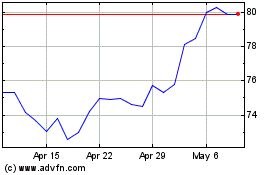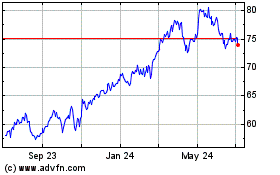Companies need to accept tradeoffs to foster “digital trust”
with employees if they want to gather the workplace data necessary
to realize the full economic and competitive benefits of the
Internet of Things (IoT) and the sharing economy, according to a
new study by American International Group, Inc. (NYSE:AIG).
The IoT’s potential seems limitless and borderless, with
sensors, storage, analytics, and other connected technology
becoming faster, smarter, and less expensive to implement. However,
realizing that potential relies on the willingness of businesses
and employees to share data so that connected devices can generate
insight, action, and value.
When benefits are perceived by those surveyed, the willingness
of businesses and employees to participate in data sharing jumps to
seventy five percent (75%) from only eleven percent (11%) when no
benefit is perceived.
Common Ground between Companies and Employees
There is common ground between companies and employees about
what conditions are needed to create a data sharing environment.
Seventy six percent (76%) of employees surveyed globally indicate
digital trust requires that employers notify them if data
collection is taking place. The same percentage of companies
surveyed (76%) agree that notifying employees about data sharing is
important.
Eighty one percent (81%) of employees also see their employer as
responsible for keeping their data private, should they choose to
share it, while more than seventy percent (70%) of companies
responded that it is important to establish clear policies when it
comes to data collection.
Both businesses and employees agree by wide majorities (89% and
87%, respectively) that laws must be updated to accommodate new
data sharing business models, balancing privacy protections with
innovation, particularly in the IoT space.
“Smart, safe data sharing will power the new economy,” said Rob
Schimek, Chief Executive Officer, Commercial Insurance, who is
unveiling the study today at the Consumer Electronics Show (CES) in
Las Vegas. “We conducted this study to quantify the tradeoffs
necessary for success in the sharing economy. A new kind of digital
trust is being built in the workplace based on these tradeoffs, and
every employer and employee using technology today is part of
it.”
Building Digital Trust
While there is some overlap in attitudes between companies and
employees about data access, differences exist that may require
tradeoffs to be made and compromises to be struck, according to the
survey.
The study shows that more than half of all businesses (56%)
believe that firms should require employees to agree to workplace
monitoring as a condition of employment. On average globally, about
the same number of companies would ask employees to wear devices
(wearables) that help ensure safety in the workplace.
Employers further indicate they would be willing to invest in
wearable devices and telematics in support of fleet vehicle safety
to realize benefits. Employers in the U.S. would invest the most,
up to $917 on wearables and $835 on telematics devices - per
employee per year – which is about the cost of a mobile phone
plan.
Employees are also interested in the safety benefits provided by
wearables at work, but not to the same degree employers are. Thirty
eight percent (38%) of U.S. and Australian workers would agree to
wearables, which was in line with workers in the U.K. and France
(40%) and Japan (36%). Employees in Italy, Singapore, and China
were most inclined to accept wearables (56%), while German
employees were least open to the idea (29%).
Of those employees globally who would accept wearables, they are
most interested in sharing workplace environmental conditions,
presumably for the benefit of their own health and safety. This
suggests there is a basis for additional incentives and trust
building to persuade more employees to share their workplace
data.
Perhaps the most challenging divide revealed in the study is
that while a majority of companies would mandate data monitoring,
employees by nearly three to one (71%) feel they should be able to
choose the data they provide to employers, rather than accept
mandatory data sharing requirements.
About the Study
The report, “The Data Sharing Economy: Quantifying Tradeoffs
that Power New Business Models,” can be accessed on
www.aig.com/innovativetech. A livestream webcast of the CES panel
session where the findings will be presented can also be accessed
today via this website (3:30 p.m. to 4:30 p.m. Pacific Time).
The report is based on the findings from a data sharing survey
commissioned by AIG that targeted employees and business
decision-makers in nine countries: the United States, United
Kingdom, France, Germany, Italy, Australia, Singapore, Japan, and
China. Approximately 400 employees and 250 business executives in
each country were asked to complete a 20-minute online survey. The
survey was executed on behalf of AIG by RTi Research, an
independent global research agency.
AIG’s study is the third in a series of research efforts to look
at the possibilities and challenges businesses face in adapting to
and harnessing the Internet of Things and, by extension, the
sharing economy.
American International Group, Inc. (AIG) is a leading global
insurance organization. Founded in 1919, today AIG member companies
provide a wide range of property casualty insurance, life
insurance, retirement products and other financial services to
customers in more than 100 countries and jurisdictions. These
diverse offerings include products and services that help
businesses and individuals protect their assets, manage risks and
provide for retirement security. AIG common stock is listed on the
New York Stock Exchange and the Tokyo Stock Exchange.
Additional information about AIG can be found at www.aig.com and
www.aig.com/strategyupdate | YouTube: www.youtube.com/aig |
Twitter: @AIGinsurance | LinkedIn:
http://www.linkedin.com/company/aig. These references with
additional information about AIG have been provided as a
convenience, and the information contained on such websites is not
incorporated by reference into this press release.
AIG is the marketing name for the worldwide property-casualty,
life and retirement, and general insurance operations of American
International Group, Inc. For additional information, please visit
our website at www.aig.com. All products and services are written
or provided by subsidiaries or affiliates of American International
Group, Inc. Products or services may not be available in all
countries, and coverage is subject to actual policy language.
Non-insurance products and services may be provided by independent
third parties. Certain property-casualty coverages may be provided
by a surplus lines insurer. Surplus lines insurers do not generally
participate in state guaranty funds, and insureds are therefore not
protected by such funds.
View source
version on businesswire.com: http://www.businesswire.com/news/home/20170104006424/en/
Matt Gallagher (Media): 212-458-3247;
matthew.gallagher2@aig.comLauren Kochendarfer (Media):
212-770-3155; lauren.kochendarfer@aig.comLiz Werner (Investors):
212-770-7074; elizabeth.werner@aig.com
American (NYSE:AIG)
Historical Stock Chart
From Mar 2024 to Apr 2024

American (NYSE:AIG)
Historical Stock Chart
From Apr 2023 to Apr 2024
